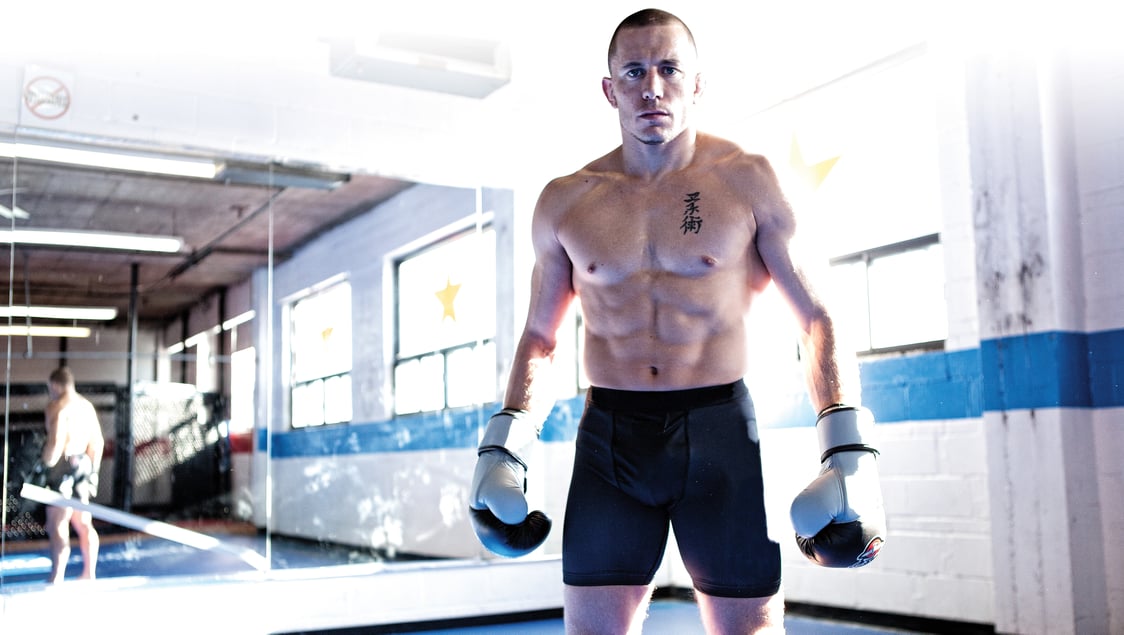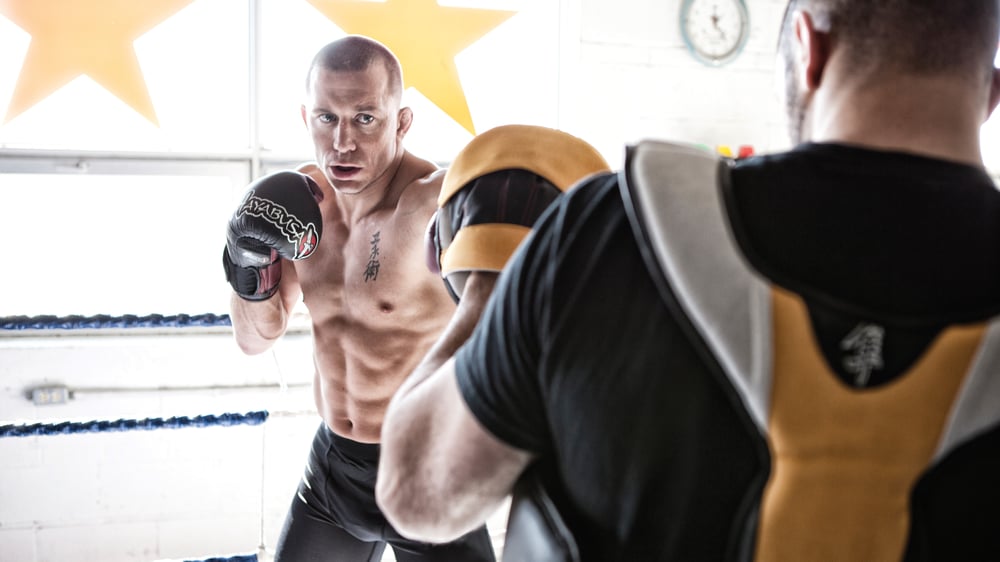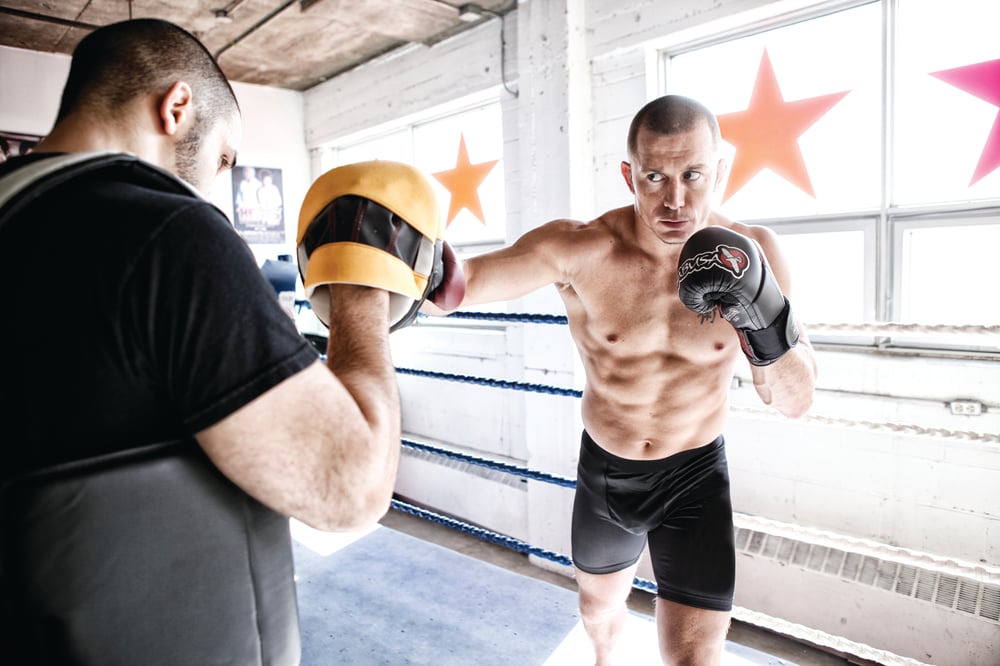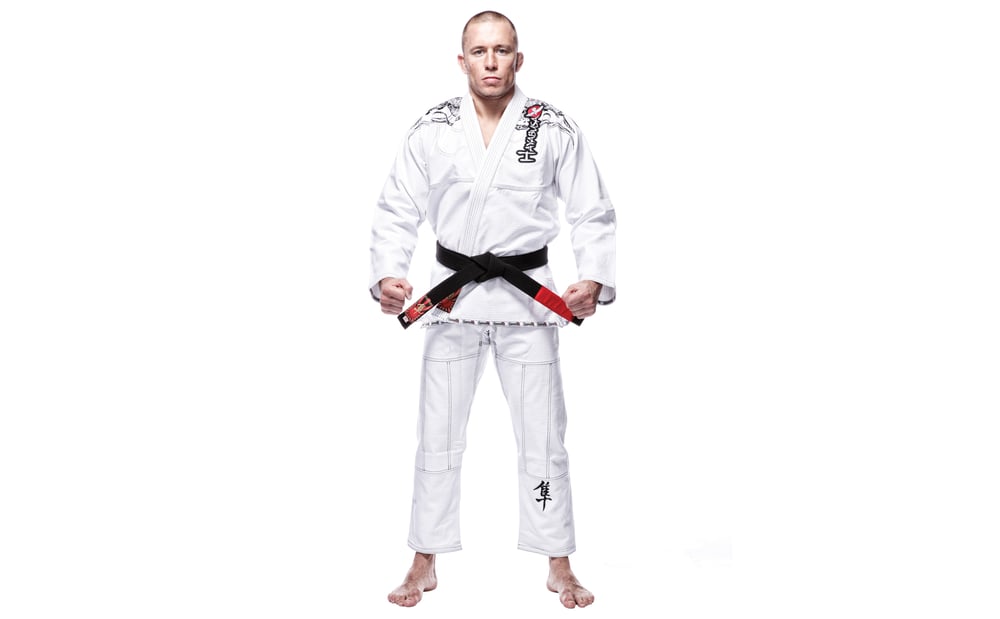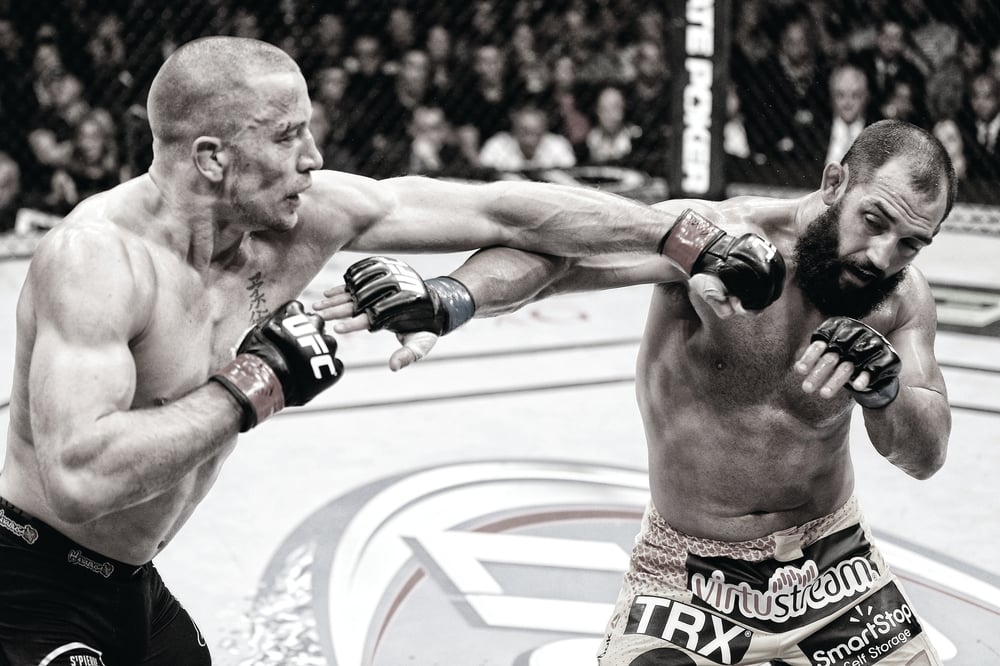
Issue 146
October 2016
The most accomplished fighter in MMA history is ready to come back, but what’s motivating Georges St-Pierre to compete again – and how far is he willing to go to add to his legacy?
When a bloodied and bruised Georges St-Pierre stepped out of the Octagon at UFC 167, 170lb championship belt still wrapped around his waist, his expression was more desolate than euphoric. His seven-year relationship with the UFC title had become like a noose around his neck. The weight of expectation was heavy on his shoulders and by the time he reached the post-fight press conference, he’d already decided to walk away from the Octagon.
And that’s exactly what he did. Three years ago in November, he walked away. But he never quit. He never retired. He never closed the door completely. Somewhere deep inside he knew the fire inside him would burn bright and he’d want to compete again. He truly believed a time would come when he would want to fight once more. And, as he tells Fighters Only, that time is now.
You only live once
When Georges St-Pierre climbs back into the Octagon he’ll enter a very different world to the one he turned his back on in November 2013. New owners, new globally-enforced drug policies, new pay-per-view stars, new challenges. He’ll return to an organization that’s grown exponentially, despite the sudden departure of its one-time most bankable champion.
That’s not to say the former world number one isn’t a welcome addition to the UFC roster – far from it. His return will undoubtedly be one of the biggest stories of the year, even in 2016 – one of the most incredible, story-filled years in the history of MMA. But in a sport that shifts so dramatically and swiftly, has he really got what it takes to add to his already iconic career?
Naturally, GSP believes he can. He tells FO that he was put on this earth to fight. So you’d better believe he’s not coming back for the attention or because anyone asked him to.
“Listen, the reason I’m coming back is because I want to do it. You only live once and I want to make the most of this part of my life and live it in plenty. I don’t want to have any regrets when I get older, ‘I should have done this, or I should have done that.’ That’s why this has been 100% my decision. And I’m proud of it every day.”
“Coming back has always been a possibility, it was never off the table. But for a long time, I never knew that I would. I never retired from MMA, I always just called it a break,” GSP tells The Hurt Business movie. “There were many reasons that pushed me to take that break. I didn’t know whether I would announce my retirement or not. But now I feel like fighting again, so that’s what I’m going to do.
“My family was very supportive of my decision. They know me well enough to know that I wasn’t happy, for many different reasons. I was carrying a lot of things on my back for many years. And now I feel rejuvenated and I’m happier than ever. The break away worked.”
GSP began his hiatus with a 25-2 résumé that featured numerous records – including the most wins in UFC title fights (12). It guaranteed his place in the UFC Hall of Fame. So why return now? He did what most champions across all sports can usually only fantasize about – he walked away on top. As the number one. So what’s the motivation to risk tarnishing his legacy?
“Every time I fight, I fight with something to prove,” says the 35-year-old. “You try to deny it and pretend that’s not important, but it is. It’s something to prove to yourself. Maybe I have nothing left to prove to the fans, but to myself, there is always something to prove.
“Mixed martial arts is not my life, but it is my passion. I try to do my best to tell people and show people about my passion. It changed my life. It made me better as a human being and I’m glad to see it continue to grow. But I want to get back into the Octagon also. It’s time.”
Culture clash
‘Rush’ admits it was a combination of things both inside and outside of the Octagon that led to his departure. The UFC’s previous drug testing policy was substandard, he believes. While the manner in which events are sold to the fans, in regards to often-ugly trash-talking and goading, still isn’t something that sits well with the sport’s greatest ever welterweight.
A martial artist to the core, St-Pierre prides himself on his professionalism and adopts the spiritual side of prizefighting. He admits he takes no satisfaction in hurting his opponents, never has, and on top of all that he simply lost his hunger for the fight. He admits he grew tired of being the man with the target on his back.
“I’ve never liked the culture of MMA,” he concedes. “I’m a martial artist. I come from a traditional martial arts background. I’m not someone who likes to talk trash about somebody else or anything like that. The culture of MMA can be quite aggressive and confrontational, and I don’t like that. I won’t promote a fight with hatred or aggression, that’s just not me. Maybe I’m different, but I’ve never liked that.
“I don’t actually enjoy hurting people. I don’t want to inflict pain on anybody. I just want to prove that I’m the best in the world. If I hurt someone in the Octagon it’s because I want to get out of there as quickly as possible. I never enter a fight to hurt my opponent, I don’t want cause damage or any chronic problem. I just want to win.”
The UFC’s anti-doping program, introduced last year and headed up by United States Anti-Doping Agency (USADA) was a breakthrough moment for St-Pierre. But it wasn’t the key to his return to arms. That decision ultimately lay square inside his mind.
He says: “I wasn’t happy. Regaining the belt when I fought wasn’t giving me the satisfaction it once did. And when I looked at the title challengers and how the belt would change their lives, make them rich, change the lives of their families, I realized they wanted and needed it more than me. They were more hungry and more motivated to win the title for the first time against me winning it another time. That’s why I said I was stepping out.
“I had to stop my life, think about what I wanted and whether I wanted to even fight again or not. In mixed martial arts, you cannot have a bad day. You have a bad day then it’s a big problem. You can get hurt, maybe take damage that affects you for the rest of your life. So I stepped out to rejuvenate myself. Once that hunger returned, once I started enjoying the sport again, then I’ve started having fun like I used to.”
Supernatural
St-Pierre’s recaptured enthusiasm for mixed martial arts brings back memories of the young man that made his Octagon debut back at UFC 46. He was infatuated with MMA then, too. Just a 5-0 novice pro, he believes he was brought in as a stepping stone for Karo Parisyan in January 2004, who was billed as a future title contender.
“I was very nervous,” he recalls. “I didn’t do as well as I thought I would do, but I also felt I was being brought in to raise the profile of my opponent. At the time he was the rising star in the UFC. He’d submitted Dave Strasser in beautiful fashion and a lot of people were talking about him. So I surprised a lot of people by winning via decision like I did.
“Before that fight, I had only competed in much smaller venues. The UFC even then was so much bigger than everything else, bigger than anything I’d seen even. So I had the butterflies inside me, but that’s normal. Nerves are always good. You just have to ensure those butterflies fly in formation. And that’s what I did.”
GSP was a natural and it wasn’t too long before his championship aspirations were realized. But he’s anything but a stereotypical prizefighter. Educated and from a strong family background, Georges insists he could have done anything with his life, yet he chose to be a fighter. And it’s this inner desire to compete and improve as a martial artist that has driven his return.
Asked what he would have done for a profession had he not chosen mixed martial arts, GSP says: “I’m not too sure, but I know I wouldn’t have been as happy as I am right now. Maybe I would have studied paleontology or kinesiology, I was studying that. But I wasn’t one of those fighters that fight because I don’t have any other choice.
“I actually chose this. MMA was my choice. I don’t do this because I am from a certain neighborhood or because I have no education, or I have no choice or no way out. No, I choose to do this. And it’s been the best decision for me, career-wise. If I could go back in time I would choose to do it the same way all over again.
“I wouldn’t change anything. Of course, I would have made more money. I would have certainly been more rich, and when I was training back in the beginning, the facilities were not what they are today. But I would still not change anything.”
Fighting DNA
A deep, often philosophical soul, St-Pierre believes his deep affinity for fighting is something that he shares, on some level, with everyone. And that’s why MMA has grown so popular over the past decade and how the UFC has gone from being $40 million in the hole 15 years ago to being sold for $4 billion this summer.
“Every human being on the planet can relate to fighting, that’s why it’s so big,” St-Pierre says. “Even my own mother, she’s a science teacher and wouldn’t hurt anybody, yet I could put her in a situation of life or death or even defending somebody that she loves, and she will have to fight. And every human being can be put into a state of mind like that.
“Fighting is instinctual. Our ancestors – years into the past – for them, trauma and conflict is normal. Fighting is in the genetic makeup of human beings, and so today people all over the world relate to mixed martial arts because it is in our DNA.”
Yet the Canadian refuses to play down claims the sport isn’t barbaric. “I’m not going to argue with people who say it is barbaric. It’s a hard sport. It’s entertainment but it’s not for everybody. I wouldn’t let my little kid watch it. If I had children I wouldn’t allow them to watch me fight until they were older. So I can’t argue with people who say MMA is barbaric.
“It’s a full-contact sport. But I’d rather a kid watch an MMA fight than watch a hockey game and see one man slash another guy with his hockey stick, which happens often. Or in basketball where players can often get involved in fighting with the fans. That happens all the time.
‘What we do is very violent, but it’s not free violence. We are willingly putting ourselves into this position to see who is the best fighter in the world. MMA is all martial arts.”
With his dominant record and whiter-than-white image, it’s perhaps surprising that St-Pierre isn’t championed more regularly as just that – the greatest mixed martial artist in history. Arguably, he has a stronger claim than Anderson Silva or Fedor Emelianenko to MMA’s fantasy top spot because of his accomplishments and utter dominance.
But he understands why many people valued the virtues of others more. And he admits he wasn’t able to change their minds three years ago. But now he’s equipped to finally do that.
“The critics have always been hard on me,” he says, “but I always paid attention to what the critics said, even if it was hard to hear. A critic will ultimately help you to become a better mixed martial artist. Whatever the critic would say I would work on to improve. For example, towards the end of my title reign, people were saying I wasn’t finishing fights the way I used to. And I found that to be true.
“And it was because I didn’t have the same drive, the same anger, to hurt the guy and to finish the fights. I tried to get that back, but it was very hard. But it was an emotional thing, so I couldn’t do it as champion. I was fighting more to win than to go through the guy, and so I walked away to get my hunger back.”
Now, Georges St-Pierre believes he’s found his hunger. The next chapter in his career could yet set him apart as the greatest mixed martial artist the world has ever known.
Leading man
Dana is the best promoter ever, says GSP
While the UFC’s Las Vegas boardroom may look quite different in the coming months after the UFC’s acquisition by WME-IMG, the man at the forefront will remain the same. Dana White is staying on as president of the promotion, despite the change of ownership, and St-Pierre says it’s a smart move by the incoming investors.
“He faces a lot of criticism but I believe he’s the best promoter in full-contact sports there has ever been,” GSP states. “Because whether you hate him or you like him you don’t ignore him. And in a way he doesn’t care whether you like him or not, that’s why he’s so good.
“In my book, he’s the best ever. Better than Don King, better than everyone. He’s working in a sport that’s not as well known as boxing, but he’s the best at what he does. When it comes to promotion, he’s the best human being there is to make you tune into something.”

